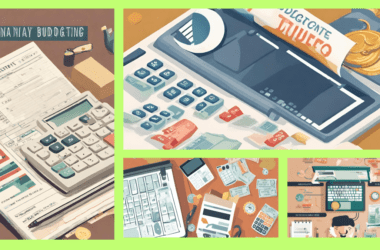Budgeting is the cornerstone of financial success, providing a roadmap to manage income, expenses, and achieve financial goals. In this guide, we’ll explore the crucial steps to initiate a budget that suits your lifestyle and ensures financial stability.
Importance of Budgeting
Budgeting is not just about restricting spending; it’s a powerful tool to gain control over your finances. It empowers you to make informed decisions, avoid debt, and work towards financial freedom.
Financial Well-being
A well-structured budget contributes to overall financial well-being, reducing stress and promoting a sense of security. It’s a proactive approach to manage your money rather than reacting to financial crises.
Understanding Your Finances
Assessing Income
Begin by evaluating your income sources. Consider your primary job, side hustles, or any passive income. Knowing your total income is the first step to effective budgeting.
Listing Expenses
Create a comprehensive list of your monthly expenses. Categorize them into fixed (mortgage, utilities) and variable (entertainment, dining out). Understanding where your money goes is essential for budget planning.
Identifying Financial Goals
Define short-term and long-term financial goals. Whether it’s saving for a vacation or planning for retirement, clear objectives help shape your budget.
Creating a Realistic Budget
Setting Priorities
Determine your financial priorities. Allocate funds to necessities first, such as housing and groceries. Then, distribute the remaining funds to other categories based on importance.
Allocating Funds
Divide your income among different expense categories. Ensure you allocate some funds to savings and emergency funds. This provides a safety net for unexpected expenses.
Emergency Fund
Building an emergency fund is crucial. It acts as a financial cushion during unexpected circumstances, preventing the need to dip into savings or accumulate debt.
Tools for Budgeting
Budgeting Apps
Utilize technology to your advantage. Numerous budgeting apps are available, making it easier to track expenses, set goals, and receive financial insights.
Spreadsheets
Traditional methods, such as using spreadsheets, remain effective. They offer flexibility and customization, allowing you to tailor your budget according to your preferences.
Traditional Methods
Some individuals prefer the simplicity of traditional methods like pen and paper. Choose a method that aligns with your comfort and ensures consistent tracking.
Cutting Unnecessary Expenses
Identifying Non-Essentials
Review your expenses critically. Identify non-essential items or services that can be temporarily cut or replaced with more affordable alternatives.
Negotiating Bills
Explore options to negotiate bills, such as cable, internet, or insurance. Many providers offer discounts or promotions, especially for loyal customers.
Saving on Daily Expenses
Small changes in daily spending habits can accumulate significant savings over time. Be mindful of impulse purchases and look for cost-effective alternatives.
Building and Maintaining Credit
Importance of Good Credit
A good credit score opens doors to favorable financial opportunities. It can affect loan approvals, interest rates, and even job opportunities.
Strategies for Building Credit
Consistently pay bills on time, maintain low credit card balances, and avoid opening too many accounts. These practices contribute to a positive credit history.
Monitoring Credit Score
Regularly monitor your credit score to identify any discrepancies or potential issues. Several credit monitoring services provide free access to your credit report.
Saving for the Future
Retirement Planning
Allocate a portion of your budget to retirement savings. Take advantage of employer-sponsored plans or consider individual retirement accounts (IRAs).
Investment Opportunities
Explore investment options based on your risk tolerance and financial goals. Investments can generate additional income and contribute to long-term financial security.
Long-Term Financial Security
A budget isn’t just about managing today’s expenses; it’s about securing your financial future. Make strategic decisions that align with your long-term aspirations.
Dealing with Debt
Strategies for Debt Repayment
Prioritize high-interest debts and create a repayment plan. Consistent payments contribute to debt reduction and improved financial health.
Avoiding Accumulation
Prevent the accumulation of new debt by making conscious spending decisions. Differentiate between needs and wants to maintain a balanced budget.
Seeking Professional Advice
If overwhelmed by debt, consider seeking professional advice. Credit counseling services can provide guidance and help negotiate with creditors.
Adjusting the Budget as Needed
Life Changes
Life is dynamic, and so should be your budget. Be prepared to adjust your budget based on life changes, such as a new job, marriage, or the birth of a child.
Economic Fluctuations
External factors like economic fluctuations can impact your budget. Stay informed and adjust your financial plan accordingly to navigate uncertain times.
Regular Reviews
Regularly review your budget to ensure it aligns with your financial goals. Adjust categories as needed and celebrate achievements along the way.
Overcoming Common Budgeting Challenges
Procrastination
Procrastination is a common obstacle. Overcome it by breaking down tasks into smaller, manageable steps. Celebrate small victories to stay motivated.
Unexpected Expenses
Expect the unexpected. Incorporate a buffer in your budget for unforeseen expenses, ensuring you’re prepared for emergencies without derailing your financial plan.
Lack of Discipline
Building budgeting discipline takes time. Start small, gradually incorporating new habits. Consistency is key to developing lasting financial discipline.
Celebrating Financial Milestones
Acknowledging Achievements
Celebrate financial milestones, whether it’s paying off a loan or reaching a savings goal. Acknowledging achievements reinforces positive financial habits.
Setting New Goals
After reaching a milestone, set new financial goals. This keeps you motivated and ensures continuous progress on your financial journey.
Staying Motivated
Maintain motivation by visualizing the benefits of financial stability. Whether it’s a dream vacation or early retirement, keeping your goals in mind helps overcome challenges.
Sharing Budgeting Tips
Family Budgeting
Involve your family in budgeting discussions. Teaching children about money from an early age instills financial responsibility.
Teaching Children About Money
Educate children about money management. Simple lessons about saving, spending wisely, and the value of money lay the foundation for a financially literate future.
Encouraging Financial Literacy
Promote financial literacy within your community. Share budgeting tips, resources, and success stories to empower others on their financial journey.
Success Stories
Real-Life Examples
Highlight real-life success stories of individuals who transformed their financial lives through effective budgeting. Inspire readers with relatable experiences.
Inspiration for Readers
Provide inspirational stories that resonate with a diverse audience. Showcasing various paths to financial success reinforces the idea that anyone can achieve financial stability.
Conclusion
Recap of Key Points
Starting a budget is a transformative step towards financial independence. By understanding your finances, creating a realistic budget, and adapting to changes, you pave the way for a secure and fulfilling financial future.
Empowering Financial Independence
Empower yourself with the knowledge and tools to take control of your financial destiny. Starting a budget isn’t just a task; it’s a journey towards financial independence and peace of mind.
Frequently Asked Questions (FAQs)
- How often should I review my budget? Regularly review your budget, at least monthly, to ensure it aligns with your financial goals and make adjustments as needed.
- Is it necessary to use budgeting apps, or are traditional methods effective? The choice between budgeting apps and traditional methods depends on personal preference. Both can be effective; choose the one that suits your style.
- What should I do if unexpected expenses arise and disrupt my budget? Budget for unexpected expenses by including a buffer in your monthly plan. If unforeseen costs arise, adjust your budget accordingly without compromising essential categories.
- How can I stay motivated to stick to my budget long-term? Stay motivated by setting achievable financial milestones, celebrating successes, and consistently visualizing the benefits of financial stability.
- Is seeking professional advice for debt management a good idea? If overwhelmed by debt, seeking professional advice from credit counseling services is a wise decision. They can provide guidance and help negotiate with creditors.


